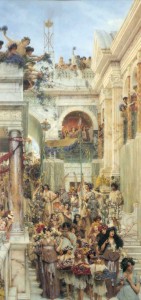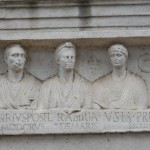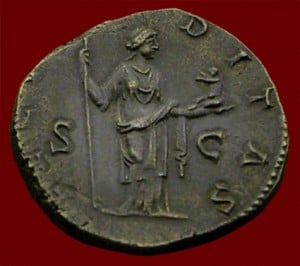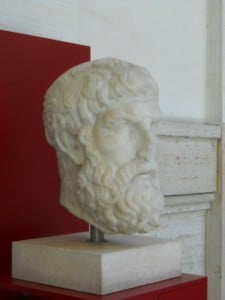Deck the Halls
Over the years the one question that I have been asked most often at this time of year is how does a good practitioner of the Religio Romana deal with friends and family members who follow other religious traditions? In other words, can I remain a cultor Deorum Romanorum and still have a Christmas tree? Or keep my menorah? After all, most modern practitioners of the Religio Romana came from family traditions that were either Christian or Jewish and thus feel conflicted on how to celebrate the season.

First, the Religio Romana is not an exclusionary religion. When in Rome, one may do as the Romans do, but when the Romans were themselves in Athens, then they celebrated like Greeks; in Syria they celebrated the Dea Sirea, Allath; and throughout Britannia, Gallia, and Hispania Romans adopted numerous Celtic deities. So, when invited to a holiday celebration of friends or while in foreign lands, it is a very Roman attitude, one of pious respect towards all Gods and Goddesses, to join in their celebrations.
Secondly, and quite obviously, the traditions that have grown up around Christmas especially, are originally from pagan traditions anyway. So, again, not being an exclusionary tradition, practitioners of the Religio Romana should have no concern of keeping faith with our Gods even as we celebrate foreign Gods. Decorate your Christmas tree, Attys’ pine, or Adonis’ palm, with Buddha meditating under it, lit up with a menorah. True Romanitas holds that one ought to retain and honor your family’s traditions. So if you grew up in a Jewish family and have good memories associated with those past holidays, why wouldn’t you want to include them in your celebration of Saturnalia? The same with childhood memories from Christian families and all the family traditions that evoke them. They belong as a part of your own tradition.
But then, how does one specifically celebrate Saturnalia? Well, to start with, there is the decoration of the house. One story tells how Saturn came to Rome by boat and was greeted by the arborigenes with a bough of pine. Pine is a symbol of purity in the Religio Romana, and at this time of year pine boughs and wreaths of pine decorate our houses. Another story tells how the land was so bountiful during the reign of Saturn, and thus bowls of fruit and nuts, as well as candies and decorations in the shape of fruit, are used as ornaments. Another story is told, too, of how Hercules, while passing through Italy, taught some Greeks to abandon their blood sacrifices and instead offer candles to Saturn. It thus became a custom in ancient Rome to give out red candles to friends at Saturnalia, a tradition still used by cultores when decorating their houses. Another custom of ancient Rome was to exchange figurines made of pastry or earthenware. Therefore baked sigillaria with images of the Gods or other scenes are used as decorations and as gifts. For holidays such as this, my grand parents made a type of pressed Italian cookies, called pizzelli, on which were stick figures of a man and a woman. The man, wearing a conical helmet, offered a glass of wine. Below were initials to signify Giove and Giovina, their names for Jupiter and Juno. Sharing the pizzelli was just one way of bringing the Gods into our celebrations. Cut-out cookies and marzipan figures are more than just treats or decorations, as they represent well wishes and blessings between celebrants. Another gift that ancient Romans passed out among friends were pens and stationary so that they might continue to write one another after the holidays. Today this is represented in the Saturnalia cards sent out to family and friends, which are then hung up as more festival decorations.
And so, if you entered the home of a modern practitioner of the Roman religion today, then you would likely see a house decorated in red ribbons, green boughs, and pure white – the colors of Saturnalia, with cards and a decorated pine, bowls of sweets and nuts, bottles of wine and other libations, along with wrapped presents, and smell the scents of spices from distant lands, baking breads, and roasting meats. You really wouldn’t readily distinguish it from a house decorated for Christmas, not unless you looked closer at some of the decorations perhaps. That little Adonis standing erect under the tree might hint of something different. But then it is really our holiday, originally, even if Christians adopted the season and all our traditions as their own. Why should that distract us from celebrating our own holiday season in Roman fashion?
IO SATURNALIA !
IO TRIUMPHI !
IO SATURNALIA !















